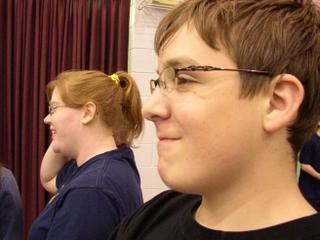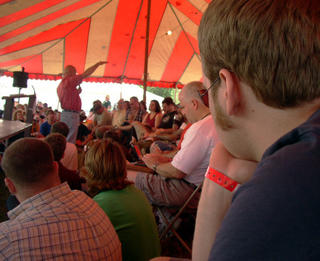 Beyond Absolutism, Pluralism, and Relativism: Brian McLaren 7/02/05
Beyond Absolutism, Pluralism, and Relativism: Brian McLaren 7/02/05I. Why do Christians want to destroy other cultures?
Remember when the Taliban destroyed those Buddhist statues in Afghanistan?
What if the U.S. ran Afghanistan, and not the Taliban at that time. Brian McLaren says suppose Franklin Graham was VP and Tim LaHae was Secretary of State, just to throw some names out there. Would it have been ok for them to destroy Buddhist art? Is it morally permissible?
If you say it's ok to keep the art, then you have a post-absolutist view.
The Christians have a mixed history. They destroyed Viking art, but preserved the Greek and Roman culture.
What does the Christian do when encountering other faiths?
What kind of story is the Christian story? Does it want to destroy another story?
Why do we preserve some cultures in the name of Christ, but not others?
McLaren tells the story of a Korean seminary student, who came to Mars Hill, despite already having a divinity degree. In Korean seminary, he had learned Christian culture was good, and everything else bad. And for some reason, Greek, Roman, and European culture needed to be learned, but not his native culture.
It wasn't until this student was in the U.S. that he picked up a book of poetry by a notable Korean. He couldn't put it down. He stayed up all night reading it. He came to appreciate his own culture. That doesn't mean he put this poetry on the same level with the bible, he just understood.
II. Eliminating the other stories?
The problem with meta-narratives, McLaren says, is that they are totalizing. They want to get rid of the other stories.
But McLaren says, it my narrative kills millions, I'm not happy about it.
He makes it clear, "I think relativism is a bad thing. It is a poison."
McLaren is not suggesting what works for you is ok, even if it doesn't work for me.
Instead he suggests...
III. The redeeming story
The Christian story redeems.
Some meta-narratives (big stories) want to bulldoze all other stories -- blow them up. Fundamentalist Islam is like this. Some Christians are too. McLaren doesn't care for that.
Following 9/11 McLaren was afraid there would be retaliation against Muslims. There were four mosques in the area, none of which McLaren had ever visited. He decided to write them a letter, and hand deliver them, expressing his concern for violence against Muslims, reassuring them he did not condone it, and could help any way he could. Mosque after mosque had its gate closed. But the fourth one had it's gate open -- just to let a news crew out. McLaren gunned it, and made it in.
This must have scared the clergy there. But when McLaren talked to one, the man welcomed him inside.
Now the two men are friends. McLaren says it's "not a betrayal of faith, but an expression of faith" to have friendships with non-Christians.
Anyway, they decided to hold a multifaith service, where various clergy, and their congregations were invited. Each clergyman was to answer the same question. What is my duty to my neighbor according to my religion?
It was held in a mosque, women in one room, men in the other. To McLaren's chagrin, some of his church members showed up late... and women included wandered into the men's room, but no one said anything.
IV. Consumerism
Consumerism is the power of the economy based on greed. It's the ultimate meta-narrative, McLaren says. It's very dangerous.
Christians who fall into relativism can fall prey to militaristic consumerism he feels.
It turns everything, faith included, into a commodity. Popularity is all that matters.
It's seen in the popular eschatology of the day (the view of the end times) -- i.e. Left Behind. McLaren fears this fosters a sense that Christians don't fight injustice, because there's no reason to. Just head for the lifeboat.
But McLaren hopes for another solution...
V. Redemption
The solution is to see the Christian faith not as a meta-narrative bent on destroying all other stories, but as a redeeming movement, to redeem those stories.
He points to Handel's Messiah, the Hallelujah chorus.
The kingdom of this world is become
The kingdom of our lord, and of his Christ
Not, we wiped out all the other kingdoms. No, we redeemed them.
It's a radical eschatology. It's a redemptive story.
VI. Redeeming Islam
McLaren had an interesting talk with a well-known Christian, who probably would not want it know that he has the following theory...
Mohammed was born about 600 AD. If we go back to the second century, there was a vibrant Christian church in Syria. They gave, fasted, and refrained from pork to God's glory.
Anyway, the Syrians rebelled against Rome. It was brutal. The Romans had more force, and launched a massive counter attack. So the Syrians fled to Arabia.
Around this time, AD 323 Rome officially embraced Christianity.
Syrians didn't like that, because they weren't in the Roman Empire. So connecting Christianity to Rome made them traitors to Arabians. They isolated themselves from Roman Christians.
This is the world Mohammed entered. This Christian McLaren talked to has this idea... Mohammed started as a polytheist, but embraced one God. In fact, he may have been a Syrian Christian, head of the church, but he didn't claim the Christian title, because he didn't want to be associated with Rome.
If we want to redeem Muslims, we need to tell our stories, and see where they intersect.
Admit that Christians have a problem. We were silly to affiliate with Rome and kill your ancestors. We acknowledge our historical failure.
However, if you want to get out of the problem of violence, Jesus has a lot to say.
That's the story we need to tell...
to be continued...









